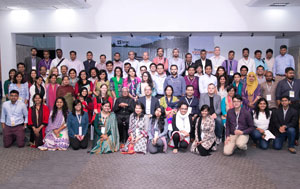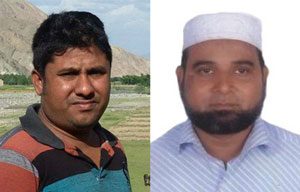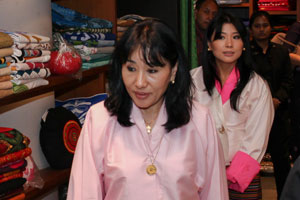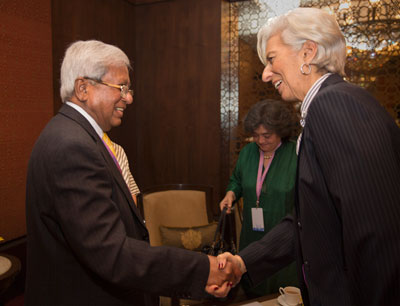
News (826)
BRAC holds Frugal Innovation Forum 2016
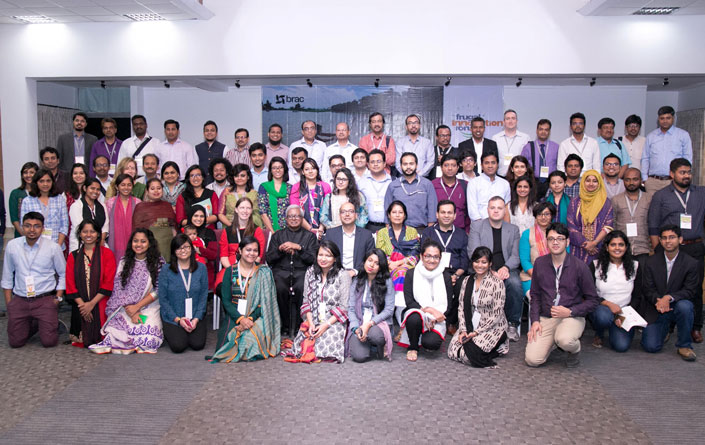
BRAC held the fourth Frugal Innovation Forum from 23-24 March 2016 in Savar, Bangladesh with the theme of scaling resilience. The forum showcased financial, social, and technological innovations that non-governmental organisations and other implementers are using to strengthen communities that are facing the effects of climate change.
The forum was designed to explore effective innovations and create opportunities for dialogue among leaders in the global south. Speakers from organisations that are building resilience in innovative ways, such as Goonj, iDE Nepal, The Mojolab Foundation, and Medic Mobile were featured in panel and plenary discussions. In addition, representatives from various grassroots organisations and thought-leaders on the subject including Ainun Nishat, Jaideep Prabhu, Rizwana Hasan and Arif Jebtik also presented and highlighted ways to build resiliency in the face of natural and man-made disasters.
“Resilience-building mindsets and creativity at the community and government level are necessary for communities to not only cope when faced with disaster, but to thrive,” Jaideep Prabhu said during the opening session. Mr. Prabhu said that top-down policies need to be balanced with grassroots, bottom-up solutions to build resiliency ahead of disaster.
The major sessions included financial innovations to foster household resiliency, innovations in adaptive livelihoods and agriculture, and also explored how policy can strengthen communities ahead of natural disasters in South Asia.
The two day long forum ended with a session with BRAC founder and Chairperson Sir Fazle Hasan Abed moderated by Mr Prabhu. The discussion mostly focused Bangladesh’s growth in the last few decades. Highlighting some of them Sir Fazle said that Bangladesh’s life expectancy at birth is higher than that of Pakistan and India although both the countries have higher per capita income than Bangladesh. But unfortunately, the country has a long way to go in terms of ensuring gender equality and meeting the growing demand of urbanisation.
Two BRAC officials abducted in Afghanistan
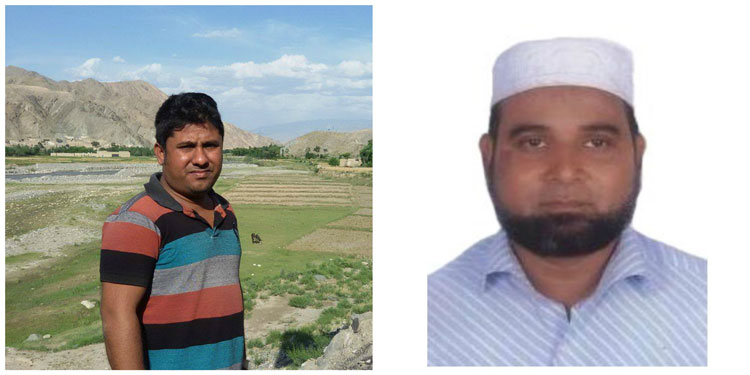
BRAC Afghanistan's staff KM Sirazul Islam (left) and Mohammad Showkat Ali (right)
18 March 2016, Dhaka. It is with great regret that we announce that Engineer Mohammad Showkat Ali, Chief Engineer, National Solidarities Programme and KM Sirazul Islam, Regional Accountant, Girls Education Challenge (GEC) project were abducted on 17 March 2016 from Shenowari of Baghlan e Markazi district under Baghlan province in Afghanistan. The incident happened when they were returning to Kunduz province BRAC office from a scheduled field visit.
BRAC is fully engaged in dealing with this crisis. BRAC Afghanistan authorities are in constant communication with the law enforcement agencies and the local administration and also has dispatched a team to Baghlan to coordinate the rescue efforts.
In immediate response, Ministry of Foreign Affairs of Bangladesh and Ministry of Interior of Afghanistan have assured their full cooperation.
BRAC officials in Bangladesh have been in communication with the families of Showkat and Siraz, keeping them informed of the latest situation and providing all necessary support.
BRAC has been in operation in Afghanistan, the first country presence of BRAC International, since 2002 helping the country to rebuild after the war. It currently runs programmes in health, girls education and is a partner of the Afghan Government in their National Solidarity Programme initiated to rehabilitate 5000 villages in Afghanistan. Its total budget for 2016 is about 15 million USD and it has a staff of 857 with about 61 of its staff being from Bangladesh and rest being from Afghanistan.BRAC's Afghanistan operation has reached 5.6 million people so far. For more information on our Afghanistan programme, click here.
BRAC is working all out to ensure a safe and speedy release of its abducted staff members.
Queen Mother of Bhutan visits BRAC
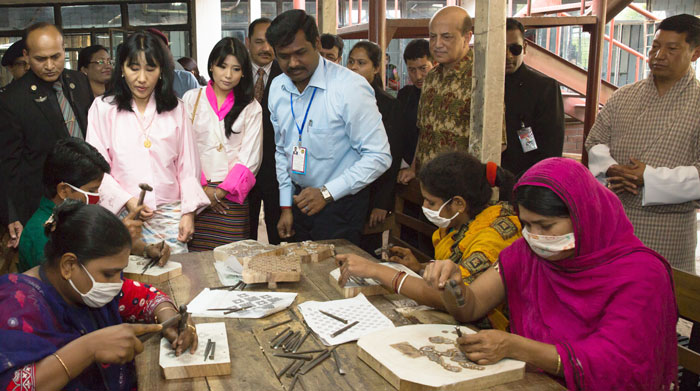
Her Majesty the Queen Mother Ashi Tshering Pem Wangchuck of Bhutan visits BRAC on her first trip to Bangladesh. As President of the Bhutan Youth Development Fund (YDF), Her Majesty is here for a five-day study trip to explore possibilities for collaboration between BRAC and YDF.
On Tuesday, 15 March, Her Majesty met with Sir Fazle Hasan Abed, the founder and chairperson of BRAC, at BRAC Centre. Admiring Bangladesh she said, “I am very impressed to see Bangladesh’s growth. I can see the discipline and it’s phenomenal.” She added, “We are very keen to collaborate with BRAC. It is remarkable that BRAC has touched so many lives and we have so much to learn from BRAC’s success.”
Thanking Her Majesty, Sir Fazle said, “Bangladesh is on the path to increase development growth rate. Last year it was 6% and we are hoping this year it would be 7%. But still 20% people live in poverty and BRAC is working to eliminate poverty and provide equal opportunity to all. We will be happy to collaborate with YDF”
In the evening, Her Majesty met the Honorable Prime Minister Sheikh Hasina at the Gonobhaban.
Her Majesty and YDF officials visited BRAC’s Ayesha Abed Foundation production centre and the Aarong Flagship Outlet on 16 March, Wednesday.
Her Majesty the Queen Mother was accompanied by Her Royal Highness Ashi Chimi Yangzom Wangchuck, the Vice President of the YDF, Ambassador of Bhutan to Bangladesh Her Excellency Pema Choden, YDF officials, and officials from the Royal Bhutanese Embassy in Dhaka.
Sir Fazle joins Advancing Asia conference in Delhi
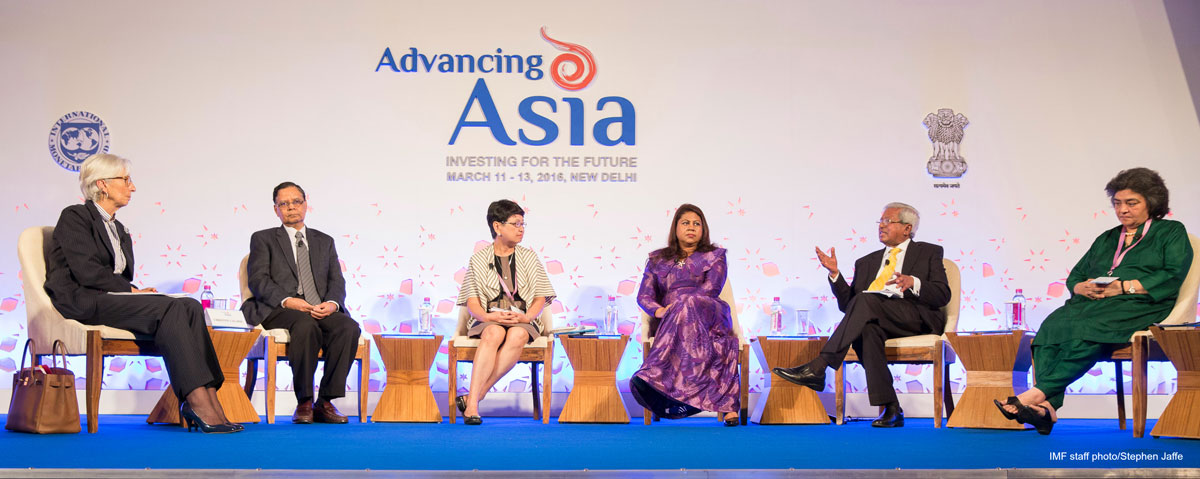
BRAC's chairperson Sir Fazle Hasan Abed joined a panel discussion today, 12 March, on Income Inequality, Demographic Change, and Gender at the three-day-long Advancing Asia conference in Delhi, India. He was joined by Milwida Guevara, CEO of Synergeia Foundation, Philippines, Arvind Panagariya, Vice Chairman of NITI Aayog India, Azeema Adam, Governor of Maldives Monetary Authority and Zia Mody, Partner, AZB and Partners, India. The session was moderated by Christine Lagarde, the managing director of the International Monetary Fund (IMF).
Watch the session here.
Learn more about Advancing Asia Conference here.
Safe Spaces for Women at Workplace
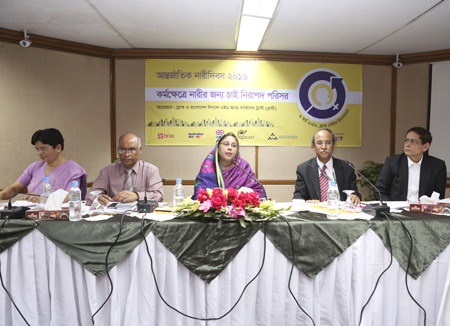
“Ensuring safety at workplace can help increasing women’s participation in the working sector” -said state minister of MoWCA Begum Meher Afroze Chumki, MP
State minister for Ministry of Women and Children Affairs (MoWCA) of Bangladesh Government, Begum Meher Afroze Chumki, MP, emphasised on women’s safety at work place to increase women’s participation, at a national dialogue today. The dialogue titled “Safe Spaces for Women at Workplace” was jointly organised by BRAC and Bangladesh Legal Aid Services Trust (BLAST) to mark International Women’s Day 2016.
As more women are participating in work outside home than ever before, ensuring safety for women at their workplaces has now become one of the most pressing agendas. Although the High Court issued a directive in 2009 to prevent and provide protection against sexual harassment at all workplaces, compliance with this directive is still not up to the mark. The dialogue was organised to start a conversation among private sector organisations to address the issue.
Barrister Sara Hossain from BLAST highlighted the nature of sexual harassment and what are the barriers for women to complain against it. She also put emphasis on the high court directive on sexual harassment redressal in her presentation. She said, “Even after seven years of the high court directive on sexual harassment redressal, it has not been made a law. In addition to this, the conditions or exact penalty in case of non-compliance with the directive is still not clear.” In her presentation she also stressed that the guideline only talks about the women, there is no mention of the third gender.
Maheen Sultan, visiting fellow of BRAC Institute of Governance and Development made a presentation on “Addressing sexual harassment in the garments sector: Good practices and findings”.
BRAC’s programme head of human rights and legal aid services (HRLS) Sajeda Farisa Kabir’s presentation addressed BRAC’s experience and learning in Addressing sexual harassment in the workplace. BRAC has more than a decade of experience in addressing sexual harassment issues at workplace, providing support to its 112,934 national staff, working in 64 districts and more than 8,000 staff working in 11 countries.
Present at the event were representative from private sector organisations like Nestle Bangladesh, Afroz, Incepta. The dialogue was moderated by BRAC's executive director Dr Muhammad Musa.
Rebuilding Livelihood of the Ebola Affected Petty Traders project
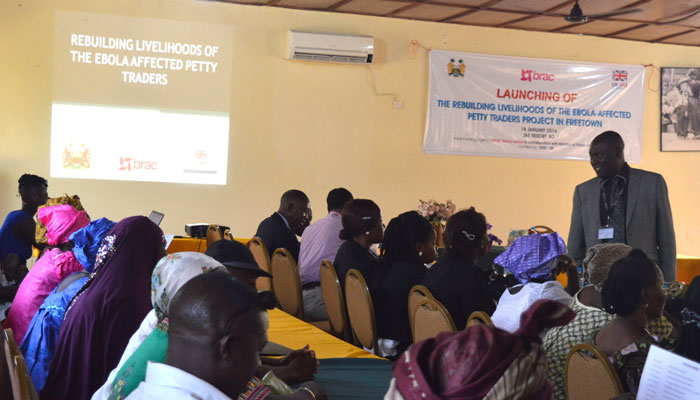
BRAC Sierra Leone in collaboration with the Ministry of Trade and Industry launched the Rebuilding Livelihood of the Ebola Affected Petty Traders project at Njala Venue, Freetown on 8 January. As part of the project, sensitisation sessions were rolled out in different parts of the country where the project will be implemented; briefing key stakeholders on the different components of the project and creating awareness.
The project is funded by DFID and executed by a consortium consisting of BRAC, World Vision, World Hope International and Catholic Relief Services (CRS). BRAC Sierra Leone will cover 12, 036 beneficiaries in 4 districts; CRS will cover 6,110 beneficiaries in 3 districts and World Hope International will cover 3,441 beneficiaries in 2 districts. The main objective of this project is to support 29,400 petty traders affected by Ebola through soft loan, start-up business capital and capacity building training. It also aims to recapitalise micro finance institutions to ensure access to finance by petty traders and also long term sustainability.
Primary education in Bangladesh goes digital
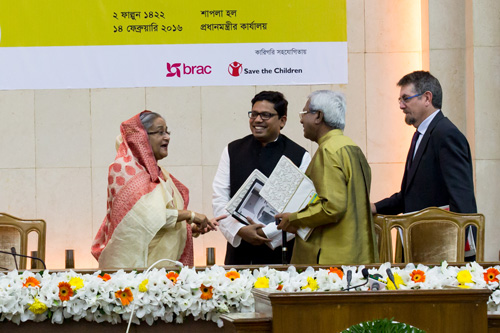
Prime Minister officially launches new interactive digital multimedia content to cover entire primary school curriculum
“Emphasis has been given to ensure taking tech-based education system to every corner of the country,” said Prime Minister Sheikh Hasina today at the official launch of the new, interactive digital multimedia content. The digital content covers the entire curriculum of primary education (grades 1-5) and will be accessible on any device.
“To improve the quality of education, we have developed this new interactive multimedia content that will be accessible from any corner of the country,” the PM said.
Through this initiative, all of Bangladesh’s twenty million primary school students will be able to access their entire curriculum online via any device. In public schools, it is being accessed on the computers that the government has already integrated into over 1,500 digital classrooms across the country as part of its Digital Bangladesh vision.
Promo video
Present as a guest Minister of Primary and Mass Education Advocate Mostafizur Rahman, MP said, “We have already prepared 55 PTIs with multimedia projectors and they have developed interactive content. They have also trained the teachers on the content. We are training teachers on the use of multimedia projectors, digital devices as well.”
The government initiated to transform 17 books made by National Curriculum of Textbook Board (NCTB) into interactive multimedia digital education content a decade back. The multimedia content creates an innovative and engaging learning environment, moving away from the traditional teacher-centric classroom.
It was developed in response to the success in classrooms of the content previously developed by BRAC to cover Grades 6-10. The new content was funded by the Government of Bangladesh and created by BRAC and Save the Children.
Explaining this as a revolutionary initiative, state minister of ICT Mr Zunaid Ahmed Palak, MP said, “The multimedia based interactive digital content is an approach to make education more interesting and fun for children. So far, we have made multimedia classrooms in 5,000/1500 schools and we plan to reach 65,000 by 2021, thus contribute creating a digital Bangladesh”
According to research, visuals improve learning by up to 400 percent, and now those visuals will be available anywhere in Bangladesh that an internet connection can be found. Every screen, in a country where over 50 million people are online, will now be a space where families can experience fun, animated learning.
Congratulating government BRAC founder and chairperson Sir Fazle Hasan Abed, KCMG said, “BRAC has always emphasised on education from its beginning. We started our “Computer aided learning” project in 2005 to bring technology in education sector. We appreciate the government for adopting our learning and taking it all over the country. It will change the education scenario in future”.
Amongst other distinguished guests, present at the event were secretary of primary and mass education Md. Humayun Khalid, secretary of ICT Shyam Sunder Sikder, Interim Regional Director South/ Central Asia of Save the Children Mr Michael McGrath.
Interactive multimedia content is available here: http://digitalcontent.ictd.gov.bd/
To find more about BRAC’s education porgamme visit: http://education.brac.net/
Watch the event coverage here: http://www.brac.net/live
BRAC won the Amplify/OpenIDEO Urban Resilience Challenge!
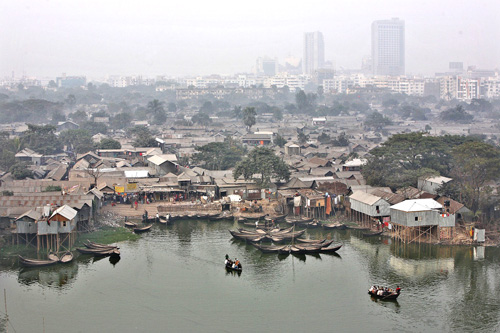
BRAC has won the Urban Resilience Challenge launched by Amplify/OpenIDEO. The idea submitted by the BRAC Urban Development Programme (UDP) for this challenge is among the 8 winning ideas which were selected from a total of 350 submissions globally. BRAC UDP’s idea involves developing community-led fire prevention and response mechanisms in the urban slums of Bangladesh.
OpenIDEO is an online collaborative that enables people from all over the world to collaborate in developing innovative solutions to pressing social and environmental challenges. OpenIDEO runs the Amplify programme which focuses on improving the lives of the billion people living in extreme poverty around the world.
Amplify will fund BRAC UDP up to 800,000 USD for a 12 months project. Amplify will also support BRAC UDP to build capacity on human-centred design approach to problem solving and develop prototypes.
The idea submitted by BRAC UDP for the Amplify/OpenIDEO Urban Resilience Challenge can be viewed in detail here -
https://challenges.openideo.com/challenge/urban-resilience/wining-ideas/community-led-participatory-disaster-management-system-to-reduce-risk-of-fire-hazard-in-urban-slums-of-bangladesh
We mourn for Dr Babar Kabir

BRAC mourns the sad demise of Dr Babar Kabir who was the former senior director of BRAC's disaster management and climate change and water, sanitation and hygiene programmes. On the morning of 15 January at around 7 am, after a severe asthma attack, he succumbed to a cardiac arrest in Dhaka. He is survived by his wife and two daughters.
Dr Kabir completed his PhD in hydrogeology in 1986 from Azerbaijan State University and has been working in the field of environment and public health since then. He has served in the capacity of senior management roles at the World Bank-WSP, UNDP Bangladesh, Ministry of Environment and Forest, Government of Bangladesh as national programme coordinator for their Sustainable Environment Management Programme (SEMP), and other multilateral and bilateral organisations. In 2007, Dr Kabir joined BRAC as director of its water, sanitation and hygiene (WASH) and disaster management and climate change (DMCC) programmes, and in 2012 he became a senior director. He was also a member of the Executive Management Committee, which is BRAC’s management decision making committee.
Hinged on his leadership, BRAC provided more than 37 million people with hygienic sanitation and another two million with access to safe water in 250 sub-districts of Bangladesh. And in 2013, after the Rana Plaza disaster, BRAC reached out to number of survivors through health protection scheme, fixed deposit, skills development training for different livelihood followed by seed funding as investment to begin new life and psychosocial counselling to cope with post-traumatic stress disorder.
In 2014, Dr Kabir left BRAC to become a consultant in the WASH and microfinance sectors. He has over 15 publications in national and international journals and has co-authored a chapter on ‘Mitigation Strategies’ of the WHO monograph on arsenic initiated by UNACC.
Today, the BRAC family is deeply saddened by the departure of such a dynamic leader and a brilliant mind that came out of this nation.
BRAC awards 10 journalists for reporting on Migration
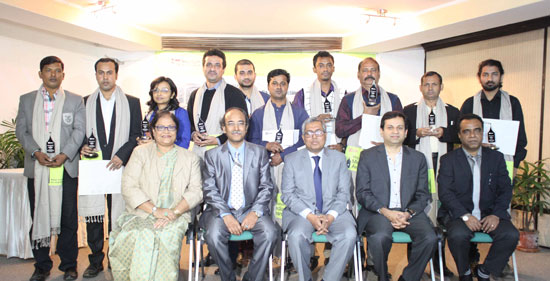
BRAC awarded 10 journalists from local and national media at an event in the capital today. BRAC Migration programme organised this event at BRAC Centre in recognition of media’s contribution in raising mass awareness on migration, migrant’s rights and welfare. This initiative was taken for the first time to acknowledge and encourage journalism in migration sector.
10 journalists from print, online and electronic media received the award from BRAC’s executive director Dr Muhammad Musa. A jury board of four members selected the winners on the criterion of raising public awareness, advocating for the rights, welfare and well-being of Bangladeshi migrant workers and their families. promoting a positive image of Bangladeshi migrants and creativity, originality and innovativeness of the content. The jury board members did not include any BRAC staff to maintain impartiality.
From the national print media category first, second and third positions were secured by Md Shariful Hasan of Prothom Alo, Md Abid Ajad Shuvo of Dhaka tribune, Belal Hossain Biplob of The Daily Star. The winners of local level category are Abu Bakar Siddiq (3rd) of Daily Jalalabad, Sylhet, Aftab Hossian (2nd) of Mayabazar, Rangpur; and Mohammad Sarif Eqbal (1st) of Laal Shobujer Desh, Khoj Khabor and Daily News, Narshingdi. Md Rabiul Islam of migrationnews.bd.com received the award in the online media category. From the electronic media category first, second and third were Salah Uddin Helali from Jamuna TV, Keramat Ullah Biplab from ATN Bangla and Jhumur Bari from 71 TV.
The keynote presentation was delivered by programme head of migration programme, Mr Hassan Imam before the award ceremony took place. Highlighting media exposure on migration he said, “Steps have been taken internationally and nationally to stop irregular migration through sea-root after substantial reporting in media.”
Present as special guest one of the jury board members, Joint Secretary of ministry of expatriates’ welfare and overseas employment Mr Kazi Abul Kalam said, “Bangladesh Government has recently rewarded BRAC for its significant work in migration sector. A special thanks to media for its strong role in bringing out stories of migrant workers in 2015. From Government, we are setting up a hotline number with the help of A2I for the migrants all over the world. We hope we will get all cooperation from media and civil society to help migrants in future.”
Appreciating media’s role in this sector BRAC’s ED Dr Musa said, “Collective effort by civil society, media and government can create a constructive movement to ensure migrant’s rights and their wellbeing. This award is our respect to media for their constructive and substantial role to ensure safe and quality migration.”
The event was moderated by BRAC’s senior director of strategy, empowerment and capacity Mr Asif Saleh. Director of BRAC’s gender, justice and diversity and migration programme was also present along with representatives from media, civil society and development organisations.
Join the world’s biggest family

